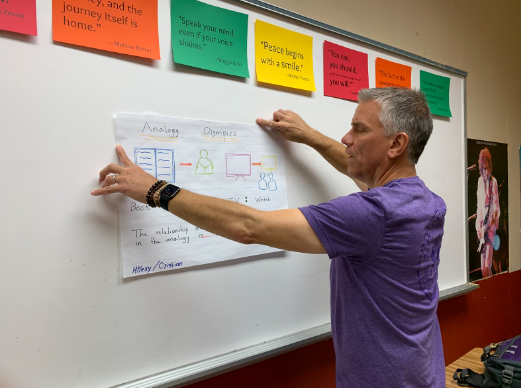
English as a Second Language teacher Tim Hoffman hangs a student-made poster in his classroom on Thursday, Sept. 9.
Tim Hoffman
With 32 years of experience teaching a wide range of subjects, as well as eight years of working as an assistant principal at Herndon Middle School, Tim Hoffman has recently arrived at CHS to teach English as a Second Language (ESL).
How does teaching at CHS compare to teaching at other schools?
I’ve only been here for three weeks now, but the feeling I have so far is that I’m very comfortable here. I’ve taught at several different middle schools and high schools in Fairfax County, and I live in the area, so I’ve always kind of known about Chantilly High School, and it’s as warm and friendly as I thought it was going to be.
What do you think is the number one goal for your students this year?
I’m an ESL teacher, and I teach English 9 and English 10 to ESL students, and the number one goal for all of my students is to make significant improvements with their proficiencies in English. They need to improve their skills so that they can take the next step in their education and eventually the next step in their careers or their life goals.
You were assistant principal at Herndon Middle School. Is your experience as an assistant principal in any way impacting your teaching here?
The short answer is no. I don’t really think my experience as an assistant principal informs me as a teacher or influences my job as a teacher. I think maybe because I’ve been teaching for so long that most of my career has been as a teacher, 32 years now in education and eight years as assistant principal, most of the time I’ve been teaching.
What do you think is the most important quality for an ESL teacher to have?
I think the most important quality for an ESL teacher is the same as the most important quality for any teacher, and that is, at the foundation, a genuine care for young students and young people and interest in helping them reach their potential. You have to like young people to be any kind of teacher. Also, I think, particularly for ESL students, if they see a teacher enjoying messing around with language writing, playing with words by translating things or trying to understand the meanings of phrases or sentences or words in other languages, I think that helps with translation. If they see the teacher is curious and loves learning, then [they are] more likely to become curious and love learning if they aren’t already that way.
What aspect of teaching do you find the most satisfying?
The most satisfying aspect of teaching is when you see that spark go off in a young person’s mind, or in their eyes, and you see that they’re really onto something that they’re interested in, when they’re onto something that they want to learn more about, or when you see a young person who’s so engaged that they’re not paying attention to some of the other things that are going on around them, because they’re so involved in what’s happening right here. It could be a piece of writing, it could be artwork, it could be a piece of music that they’re playing, but that kind of really focused attention on a learning task is a great thing for teachers to see when students are in that state.
What other subjects would you be interested in teaching if you were not teaching ESL?
Well, ESL teachers are involved in a lot of different things, because as an ESL teacher, if you are working long enough in that field, you have the opportunity to teach all sorts of different subjects because, oftentimes, you’re partnered up with another teacher and you’re co-teaching science or history or English or mathematics. Over the years as an ESL teacher, I’ve had the chance to work in all of those classrooms. I mean, I love everything, but I think the ones that grabbed my interest the most are English and science. Those are the ones I spent a lot of time working on with students.
Are there any notable challenges you face in teaching, and what do you do to overcome them?
We’ve all been through some challenges recently in the last couple years with the pandemic and how we adjust to distance learning or hybrid learning, as students or as teachers. That’s all been a challenge, and everybody’s kind of dealt with that in a different way. One of the challenges, I think, is to keep looking forward and to keep thinking, “Okay, tomorrow’s another day.” If something didn’t go the way you planned it or something kind of fell short of what your goal was, you need not to dwell on that but to learn from what happened, see what you can see, what you can do to adjust your strategy, and then attack it again the next day with positivity and energy. I think one other challenge for educators is just always keeping that energy level because teaching is a demanding job and it’s almost like you need to be training, to be ready for the task every day because there are busy days, there are long days, and it takes a lot of energy and focus.